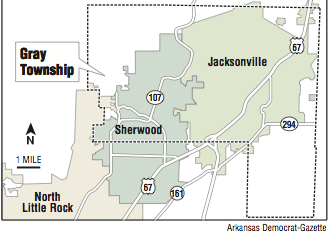Jacksonville and Sherwood are now squared away for each of their respective city councils to approve a resolution calling a special election to allow alcohol sales in a dry pocket of the urban area.
Last week, both cities instructed the Pulaski County Election Commission to provide exact voting boundaries of the Gray Township, an old voting district that covers a majority of Jacksonville, a portion of Sherwood and a sliver of unincorporated Pulaski County.
In the mid-1950s, voters in the old precinct voted the area dry. Voting districts across the county were abolished in the 1980s, but the alcohol prohibition for the area remains in place. Only voters within the original boundaries of the Gray Township, which stands at about 23,920 voters today, can reverse the 60-year-old alcohol ban.
On Sept. 7, Jacksonville and Sherwood's city councils will vote to call the special election, which is tentatively planned for Nov. 14.
The 23,920 voters would be asked to allow by-the-drink alcohol sales at restaurants, which would then be required to derive no more than 30 percent of their sales from alcohol.
Bars, clubs, liquor stores and strip clubs would still be prohibited from within the township's limits, and grocery stores and gas stations would still not be allowed to sell wine or beer.
City leaders view the issue as a matter of economic development. They believe allowing restaurants to sell alcohol will provide opportunities to grow and redefine the cities' respective downtown areas.
Jacksonville Mayor Gary Fletcher has said his city's economic development team actively tries to recruit potential restaurants and hotels to locate in Jacksonville.
But "when they realize you're in a dry area, you can almost see a wall go up," Fletcher said earlier this summer. "You've got thousands of cities that are wanting their business. Why go somewhere that's automatically dry? Because [alcohol is] where they make their money."
Cities' ability to turn their dry pockets "wet" became more feasible after a law was passed in the most recent state legislative session.
Act 144, co-sponsored by state Rep. Bob Johnson, D-Jacksonville, allows city councils to call special elections to change their alcohol laws. Before, state law required petitioners to gather signatures from 15 percent of the electorate in order to trigger an election related to alcohol consumption.
That would mean collecting about 3,600 signatures in Gray Township.
Collection efforts in 2013 and 2015 failed.
Jim Durham, director of administration for the city of Jacksonville, said officials have yet to encounter any organized opposition to lifting the booze ban in the township.
Metro on 08/21/2017

